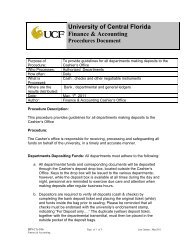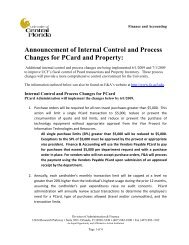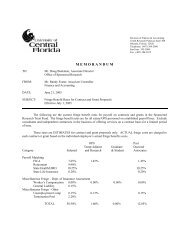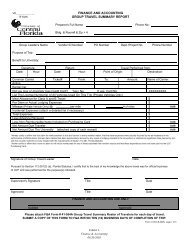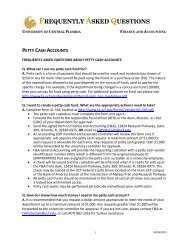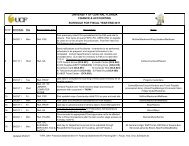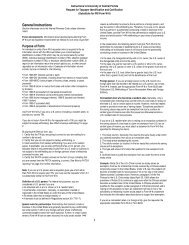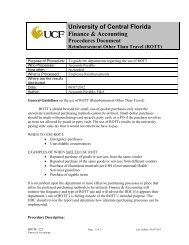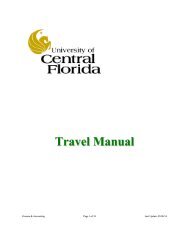Travel Manual - UCF FINANCE & ACCOUNTING - University of ...
Travel Manual - UCF FINANCE & ACCOUNTING - University of ...
Travel Manual - UCF FINANCE & ACCOUNTING - University of ...
Create successful ePaper yourself
Turn your PDF publications into a flip-book with our unique Google optimized e-Paper software.
Date - Enter the date, including the year, on a separate line for each day that the traveler is away.<br />
<strong>Travel</strong> performed from point <strong>of</strong> origin to destination - The first line will show the city and state where the travel<br />
originated to the traveler's destination. Show the traveler's location each day. The last line will show the city and<br />
state where the traveler ended the trip. For example, if a traveler whose headquarters is <strong>UCF</strong> Main Campus<br />
spends three days in Norfolk, VA, and two days in San Diego, CA, starting January 1, this column (and date <strong>of</strong><br />
column) will look as follows:<br />
1/1/2008 <strong>UCF</strong> Main Campus (Orlando, FL) to Norfolk, VA<br />
1/2/2008 Norfolk, VA<br />
1/3/2008 Norfolk, VA to San Diego, CA<br />
1/4/2008 San Diego, CA<br />
1/5/2008 San Diego, CA to <strong>UCF</strong> Main Campus (Orlando, FL)<br />
Purpose or reason - Indicate the specific purpose <strong>of</strong> the travel. The name <strong>of</strong> organizations, conferences, or<br />
conventions should be provided in full. Do not abbreviate.<br />
Hour <strong>of</strong> departure- The time <strong>of</strong> day or night the traveler leaves his/her headquarters to commence travel. When<br />
traveling by air, the university allows up to three hours prior to scheduled departure time for travel to the<br />
airport.<br />
Hour <strong>of</strong> return – The time <strong>of</strong> the day or night the traveler arrives back at his/her headquarters to end travel.<br />
When traveling by air, the university allows up to two hours after the scheduled landing time for travel from the<br />
airport.<br />
Meals – In order to qualify for meal reimbursement, travel should be for an overnight or longer stay to a<br />
location over 50 miles from headquarters. See PART G <strong>of</strong> the <strong>Travel</strong> <strong>Manual</strong>: PER DIEM AND MEAL<br />
ALLOWANCES.<br />
Per Diem or actual lodging expense - If claiming the $80 per diem rate, enter the full amount <strong>of</strong> $80 or fraction<br />
there<strong>of</strong> as shown in PART G <strong>of</strong> the <strong>Travel</strong> <strong>Manual</strong>. If claiming meals plus lodging, enter the amount <strong>of</strong> lodging<br />
for each day.<br />
Map mileage claimed – Mileage between cities may be obtained from the Internet using a Web site<br />
(http://www.mapquest.com/<br />
http://www.mapquest.com/) taken from the odometer <strong>of</strong> the personal vehicle used or taken from the mileage<br />
chart in the travel manual (see Exhibit H). Round mileage for each day to the nearest whole number. Enter the<br />
total number <strong>of</strong> miles at the bottom <strong>of</strong> the column. Multiply the total number <strong>of</strong> miles by the mileage allowance<br />
($0.445). When the traveler is riding with someone else or using a university-owned vehicle, the traveler is not<br />
entitled to a mileage allowance. A traveler will not be reimbursed for mileage or other transportation expenses<br />
when the cost <strong>of</strong> the trip is paid by another source. All travel should be by a usually traveled route.<br />
Vicinity mileage claimed – Use this section for mileage to a secondary destination(s) after reaching the primary<br />
destination. Example, traveler went from Orlando to Tampa (this mileage is considered map mileage). Mileage<br />
while in the Tampa area on <strong>UCF</strong> business would be considered vicinity miles.<br />
Other expenses - Enter incidental expenses paid by the traveler with personal funds. This column should include<br />
expenses such as taxi fares, parking, porter fees, tolls, etc. and the cost <strong>of</strong> airfare and vehicle rental. Identify<br />
incidental expenses separately. For additional information about required receipts and reimbursable expenses,<br />
see PART I <strong>of</strong> the <strong>Travel</strong> <strong>Manual</strong>.<br />
Summary total - Add up each column separately and enter the sum <strong>of</strong> the columns for Meals, Per Diem or<br />
Actual Lodging Expenses, Map Mileage Claimed, Vicinity Mileage Claimed, and Other Expenses.<br />
Less advance received - If a travel advance was paid to the traveler, enter the amount <strong>of</strong> the advance.<br />
Finance & Accounting Page 10 <strong>of</strong> 16 Last Update: 08/13/09



